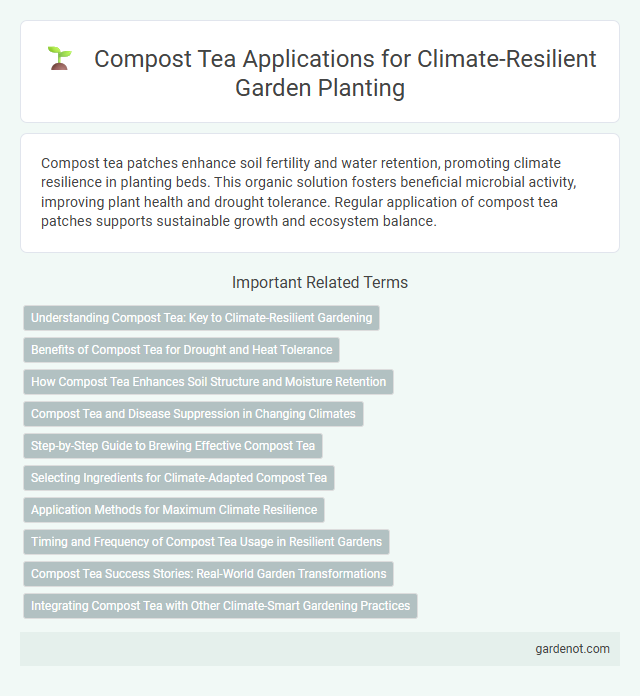Compost tea patches enhance soil fertility and water retention, promoting climate resilience in planting beds. This organic solution fosters beneficial microbial activity, improving plant health and drought tolerance. Regular application of compost tea patches supports sustainable growth and ecosystem balance.
Understanding Compost Tea: Key to Climate-Resilient Gardening
Compost tea is a nutrient-rich liquid derived from steeping compost in water, packed with beneficial microorganisms that enhance soil fertility and plant health. This bioactive solution improves soil structure, increases water retention, and boosts plants' resistance to drought and pests, making it essential for climate-resilient gardening. Applying compost tea promotes sustainable growth, reduces the need for chemical fertilizers, and supports ecosystems under climate stress.
Benefits of Compost Tea for Drought and Heat Tolerance
Compost tea enhances soil microbiome diversity, improving water retention and nutrient availability essential for drought resilience. Its application strengthens plant root systems, increasing heat tolerance by optimizing stress response mechanisms. Regular use of compost tea patches reduces irrigation needs, fostering sustainable growth under extreme climate conditions.
How Compost Tea Enhances Soil Structure and Moisture Retention
Compost tea enriches soil structure by introducing beneficial microorganisms that break down organic matter, improving soil aggregation and porosity. Enhanced soil aggregation increases pore spaces, allowing better water infiltration and retention, which supports plant roots during dry periods. This microbial activity also promotes nutrient availability, leading to healthier, more resilient plants in climate-stressed environments.
Compost Tea and Disease Suppression in Changing Climates
Compost tea, a microbial-rich liquid derived from steeping compost in water, enhances soil health and suppresses plant diseases by promoting beneficial microorganisms that outcompete pathogens. Its application in climate-resilient planting helps maintain plant vigor under stress conditions induced by temperature fluctuations and altered precipitation patterns. Research indicates that compost tea increases resistance to fungal and bacterial infections, making it a vital tool for sustainable disease management in changing climates.
Step-by-Step Guide to Brewing Effective Compost Tea
Brewing effective compost tea requires a precise sequence starting with high-quality compost rich in beneficial microbes and organic matter, combined with non-chlorinated water. The mixture must be aerated continuously for 24 to 48 hours using an aquarium pump to promote microbial growth, while adding nutrient amendments like molasses or kelp extract enhances microbial activity. Proper brewing results in a nutrient-dense liquid that boosts soil health, improves plant resilience to climate stress, and supports sustainable agricultural practices.
Selecting Ingredients for Climate-Adapted Compost Tea
Selecting ingredients for climate-adapted compost tea involves choosing organic materials rich in nutrients and beneficial microbes suited to local environmental conditions. Incorporate compost from drought-tolerant plants and nutrient-dense amendments like kelp or seaweed extract to enhance microbial diversity and promote plant resilience. Tailoring the ingredient mix optimizes soil health and supports vegetation in shifting climate zones.
Application Methods for Maximum Climate Resilience
Compost tea patch application involves evenly distributing nutrient-rich compost tea over soil patches to enhance microbial activity and improve water retention, critical for climate-resilient agriculture. This method boosts soil structure and fertility, enabling plants to better withstand drought and extreme weather conditions. Frequent, targeted applications during key growth stages maximize resilience by promoting robust root systems and sustained plant health.
Timing and Frequency of Compost Tea Usage in Resilient Gardens
Applying compost tea during early morning hours maximizes microbial activity and nutrient absorption in climate-resilient gardens. For best results, use compost tea weekly during the growing season to enhance soil health and plant immunity against environmental stressors. Adjust frequency based on plant growth stages and local climate conditions to optimize resilience and productivity.
Compost Tea Success Stories: Real-World Garden Transformations
Compost tea patches have revolutionized climate-resilient planting by enhancing soil fertility and boosting microbial activity essential for plant health. Gardens utilizing compost tea report increased crop yields, improved drought resistance, and reduced need for chemical fertilizers, validating its effectiveness in sustainable agriculture. Real-world success stories highlight vibrant, resilient ecosystems flourishing through this organic soil amendment, proving its critical role in climate-smart gardening practices.
Integrating Compost Tea with Other Climate-Smart Gardening Practices
Compost tea patch enriches soil microbiomes by introducing beneficial microorganisms that enhance nutrient cycling and increase plant resilience against climate stressors. Integrating compost tea with mulching, drip irrigation, and cover cropping maximizes water retention, improves soil structure, and reduces the need for synthetic fertilizers. This combination supports sustainable urban agriculture and promotes long-term ecosystem health under changing climate conditions.
Compost tea patch Infographic

 gardenot.com
gardenot.com